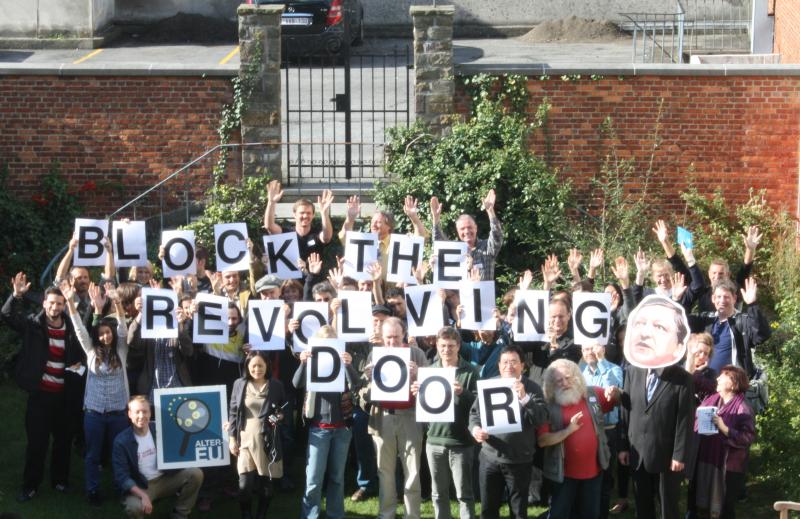
MEPs in a spin with industry
The new European Parliament is only weeks old and already three ex-MEPs from perhaps its most important committee have taken a spin in the revolving door to join the private sector. It's clear that the code of conduct for MEPs needs urgent reform.
The committee in question is the economic and monetary affairs committee (ECON) which played a key role in co-drafting EU law and regulations for the financial industry in the wake of the economic and banking crises. As such it worked on some very important pieces of legislation including Solvency II (regulation for the insurance industry), the markets in financial instruments directive (to regulate speculation in commodities), the alternative investment fund managers directive (to regulate hedge funds) and the capital requirements directive, amongst others.
And it is not rocket science to work out why the (financial) industry lobby would be very keen to gain the insights of the former MEPs who have taken part in debates, negotiations and revisions on these dossiers; who know the legislations' weaknesses and loopholes; and who will have excellent contacts both within the Parliament and in the wider EU institutions.
In May, Corien Wortmann-Kool (Netherlands, centre-right) joined the supervisory board of AEGON, the insurance multinational. In July, Arlene McCarthy (UK, centre-left) a former ECON vice-chair joined lobby firm Sovereign Strategy as deputy chair for European strategy. And perhaps most scandalously of all, Sharon Bowles, the former ECON committee chair, has now joined the board of the London Stock Exchange Group (LSEG) as a non-executive director.
LSEG, which “sits at the heart of the world’s financial community” has a clear interest in the recruitment of Bowles, considering that it operates a range of international equity, bond and derivatives markets, including the London and Italian stock exchanges.
Research by Corporate Europe Observatory has shown that during the revision of the European market infrastructure regulation (EMIR) in 2011 (which included regulation on controversial financial instruments such as derivatives) Bowles “tabled several amendments that were also tabled by other MEPs and which were probably the result of industry lobbying”.
CEO's further analysis also shows that Bowles had 10 meetings with the London Stock Exchange (LSE) in two years (2012-14) including four meetings with its chief executive Xavier Rolet, two of which were over lunch. She also spoke at the LSE's Christmas lunch in December 2012. From mid-2011 to spring 2014, Bowles' staff had a further eight meetings with the LSE, at least three of which were on the topic of MiFID (which included provisions to regulate food commodity speculation).
In a recent article on the Spiegel website, Bowles' ECON colleague Werner Langen MEP is quoted as saying that Bowles, whilst chair of ECON, always had “documents from the City of London for every topic we discussed” during legislative negotiations and “she has always insisted that the position of the City of London does not perish”.
Sven Giegold MEP told Spiegel that “Sharon Bowles was always a conspicuous market liberal when it came to the regulation of trading and stock market trading. Now she could thwart the implementation of hard-won EU rules against food speculation for the London Stock Exchange.”
Defending her new role, Bowles has told CEO that her new role requires her to "constructively challenge and help develop proposals on strategy" and that her “extensive regulatory knowledge will allow me to provide counsel and challenge the Executive management on how they are adapting their business to an evolving regulatory landscape”.
She has rejected any accusation that her move represents a potential conflicts of interest saying: “It is only through the ability of business to recruit non-executive directors (NEDs) with a full and diverse set of experiences and skills that we are able to bring greater growth and financial stability to Europe. I understand that to be the thrust of corporate governance legislation and financial supervisors engagement with NEDs”.
Bowles is also pocketing the generous transitional allowance to which former MEPs are entitled (likely to amount to €60,000) saying “I regard this as part of my contract when I was elected as I gave up a much higher earning profession”.
And what does the MEP code of conduct have to say about such moves? Pretty much nothing, apart from a requirement (apparently unenforced) that former MEPs should not use their life-long access pass for lobbying purposes. The code is clearly inadequate and needs urgent reform.
Martin Schulz is once again the new European Parliament president with overall responsibility for the enforcement of the code of conduct for MEPs. In his first stint as president (2012-14) Schulz chose not to sanction fellow MEPs found to have broken the code of conduct. Now, with the politicking of the European elections and Spitzenkandidaten process behind him, we can only hope that during his new term in office, he grabs the bull by the horns and seeks substantial reform of the MEP code of conduct to introduce new rules to regulate the revolving door.
See RevolvingDoorWatch for more information on many recent revolving door cases.
